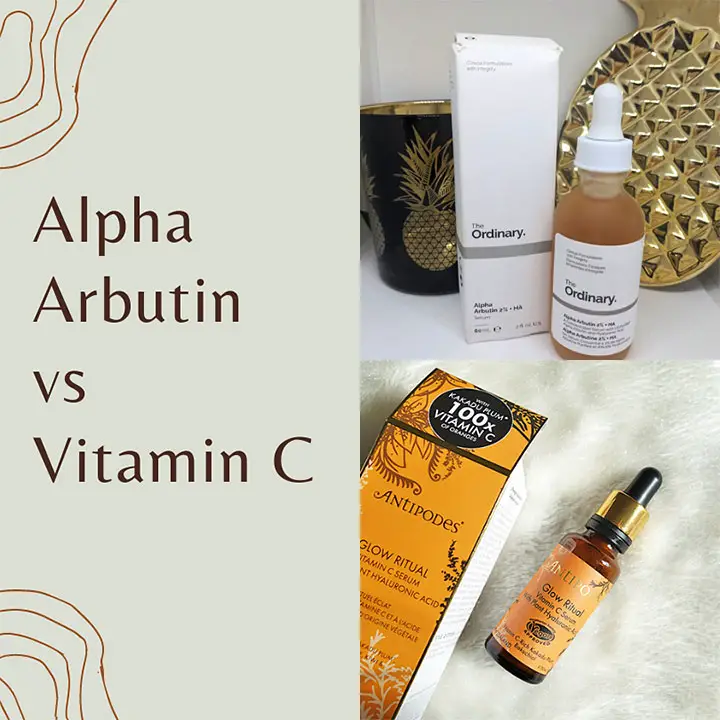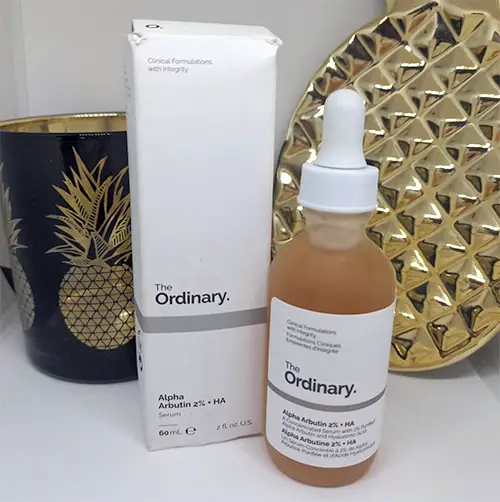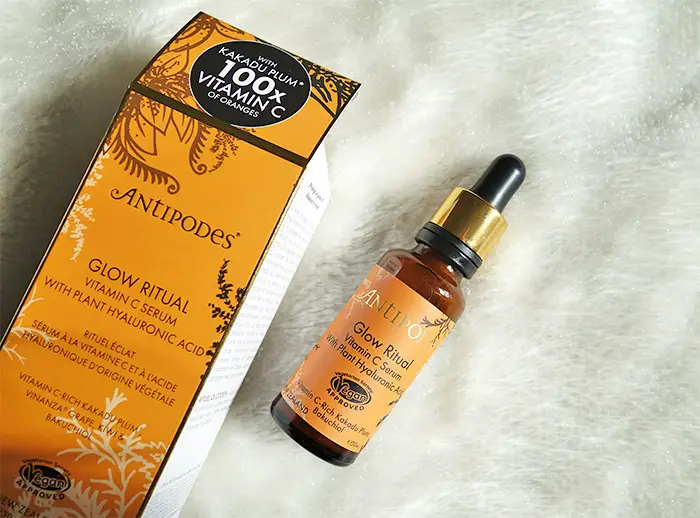
Deciding between alpha arbutin and vitamin C for brighter skin can be a challenge. Both are celebrated for their skin-brightening abilities, but each works differently.
In this article, we’ll explore the unique benefits of alpha arbutin and vitamin C, helping you understand which might be the best fit for your skincare needs. Dive in to learn about these powerful ingredients and make an informed choice for your journey towards more radiant skin.
Table of Contents
- What is Alpha Arbutin?
- Understanding Vitamin C
- Can You Use Alpha-arbutin and Vitamin C Together?
- How to Use Them together
- Alpha Arbutin or Vitamin C – Which is Better?
What is Alpha Arbutin?
Alpha arbutin is a natural ingredient derived from the leaves of the bearberry plant that helps brighten the skin. It is usually considered a natural alternative to hydroquinone for skin brightening.
Its chemical structure is similar to tyrosine, an amino acid found in the skin that reacts with the enzyme tyrosinase to produce melanin. This potent molecule helps treat hyperpigmentation by binding with tyrosinase and blocking melanin production.
Although alpha-arbutin occurs naturally, synthetic forms do exist like deoxyarbutin which is formulated to be more potent than its natural counterpart.

Benefits of Alpha Arbutin
- Gentle and Safe: Suitable for all skin types, making it a versatile choice for diverse skincare needs.
- Targeted Brightening: Effectively fades acne scars, dark spots, and sunburns, enhancing overall skin tone for a more even complexion.
- Complementary Action: Works well when combined with other skin brighteners, such as retinol and chemical exfoliators, amplifying the skin-enhancing effects.
- Antioxidant Support: Offers antioxidant properties to help protect the skin from damage by free radicals, contributing to reduced signs of aging.
Understanding Vitamin C
Vitamin C also known as L-ascorbic acid is a very popular naturally derived active ingredient best known for its potent antioxidant properties. This molecule is very effective at protecting the skin from oxidative stress and helps reduce signs of premature aging and hyperpigmentation.
Due to the instability of vitamin C molecules in water, they are often formulated in oil-based serums. The stabilized forms of vitamin C commonly used in skincare products include magnesium-ascorbyl-phosphate, tetrahexyldecyl ascorbate, ascorbyl-6-palmitate, and Tetrahexyldecyl ascorbate.
Keep in mind that the formulation influences how well Vitamin C penetrates your skin. For example, oil-soluble forms of Vitamin C can absorb more deeply into the skin compared to water-soluble forms. This deeper penetration can mean more noticeable results in terms of brightening and reducing signs of aging.

Benefits of Vitamin C
- Collagen Boost: Enhances collagen production, leading to firmer and plumper skin.
- Photoprotection and Anti-Aging: Offers protection against photo-damage while combating signs of aging.
- Melanin Reduction: Aids in reducing melanin production, effectively clearing skin discolorations.
- Skin Cell Strengthening: Strengthens skin cells and supports faster wound healing.
Alpha Arbutin and Vitamin C: Differences
Although both are great options for dealing with hyperpigmentation, there are significant differences between either molecule that may influence your choice of which active to use.
- Potency for Brightening: Alpha Arbutin is more potent in lightening dark spots, while Vitamin C requires higher concentrations for similar effects (10-20% vs up to 2% in alpha arbutin).
- Speed of Results: Alpha Arbutin typically shows faster results, often within 4 weeks, compared to the slower visible changes with Vitamin C.
- Action Mechanism: Alpha Arbutin blocks melanin production (the pigment that causes darker skin tones and spots) by mimicking a natural skin amino acid, whereas Vitamin C interferes with melanin production by affecting the tyrosinase enzyme (it does this by interacting with copper ions present in it).
- Stability: Alpha Arbutin is more stable in various formulations, especially water-based, while Vitamin C is less stable and prone to breakdown in sunlight and water.
- Antioxidant Properties: Vitamin C has a higher concentration of antioxidants, providing more significant anti-aging benefits, whereas Alpha Arbutin offers some antioxidant benefits.
Which is Better for Hyperpigmentation?
For treating hyperpigmentation, alpha arbutin is generally considered more effective. This is because it’s similar to hydroquinone, a highly effective skin lightening agent, but without the harsh side effects.
Alpha arbutin combines hydroquinone with sugars. The hydroquinone part works to slow down melanin production, which is what causes dark spots on your skin. The sugars in alpha arbutin help release this ingredient slowly, making it gentle yet effective over time. This means you get the brightening benefits of hydroquinone without any worry.
On the other hand, Vitamin C can also help with hyperpigmentation, but it’s not as straightforward. Its effectiveness depends a lot on the product’s formulation. Vitamin C is best absorbed in oil-soluble forms, but these don’t always turn into active Vitamin C in your skin. The most potent form, L-ascorbic acid, needs to be in high concentrations (10-20%) and a specific pH to work well. However, it’s not very stable, and the results can vary significantly between different products.
In summary, while Vitamin C has its benefits, alpha arbutin is typically more reliable and consistent for targeting hyperpigmentation.
Can You Use Alpha-arbutin and Vitamin C Together?
Yes, you can use alpha arbutin and vitamin C together as both ingredients are generally safe for all skin types and are rarely known to cause side effects.
Also, because of their similar depigmenting action, they can be used together for more effective treatment of discolorations.
However, for pregnant women, it is better to check with your dermatologist before using alpha arbutin.
How to Use Them together
Combining alpha arbutin and vitamin C in your skincare routine can be highly effective for brightening your skin and reducing hyperpigmentation. Here’s how to layer these products for the best results:
- Start with Alpha Arbutin: Since alpha arbutin serums are usually water-based, they should be applied first. Water-based products absorb better when applied to clean skin. Gently apply alpha arbutin serum to your face after cleansing, both in the morning and in the evening.
- Layer with Vitamin C: After applying alpha arbutin, follow up with your vitamin C serum. Most vitamin C serums are oil-based and should be layered over water-based products like alpha arbutin. This ensures both products are effectively absorbed by your skin.
- Sun Protection with Vitamin C: If you’re using vitamin C during the day, always pair it with sunscreen. Vitamin C can make your skin more sensitive to the sun, and sunlight can degrade the vitamin C itself. Applying sunscreen protects your skin and the integrity of the vitamin C product.
- Consider Vitamin C Concentration: The concentration of vitamin C in your serum will guide how often you should use it. For serums with low concentrations of vitamin C, it’s safe to use them twice daily. However, if your serum contains a higher concentration of vitamin C (around 10-20%), once a day application is sufficient. Some skincare experts suggest using higher concentration vitamin C serums at night to avoid any potential breakdown due to daylight exposure.
- Listen to Your Skin: As with any skincare routine, pay attention to how your skin reacts. If you experience irritation, consider adjusting the frequency of application or consult with a skincare professional for personalized advice.
By following these steps, you can maximize the benefits of both alpha arbutin and vitamin C, helping you achieve a brighter and more even complexion.
Alpha Arbutin or Vitamin C – Which is Better?
If your main concern is hyperpigmentation then alpha-arbutin is your best bet.
On the other hand, if your main concern is to revive dull skin and reduce signs of aging then Vitamin C is a better option. However, because of how complex hyperpigmentation is, multi-approach treatments are always recommended.
Also, most people struggling with hyperpigmentation also deal with textured skin and wrinkles all caused by exposure to sunlight. Therefore, pairing both ingredients in a single or numerous products increases your chances to smooth skin with an even skin tone.
Related content:
Alpha Arbutin vs Azelaic Acid

Petra Nakashian (previously Kravos) is a dedicated natural health and beauty blogger, driven by the loss of her parents to cancer, which led her to meticulously research beauty product ingredients. With over 10 years of experience, her in-depth knowledge has made her a trusted expert in the field. Founder of Be Healthy Now and Green Beauty Talk, Petra recently expanded her expertise with Beauty Insights Hub, exploring a wider range of beauty treatments. Committed to transparency and honesty, her work is a vital resource for navigating the complex world of beauty.

